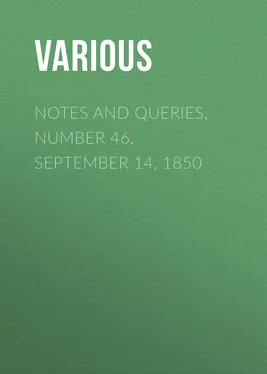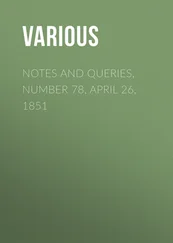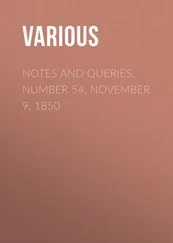Various - Notes and Queries, Number 46, September 14, 1850
Здесь есть возможность читать онлайн «Various - Notes and Queries, Number 46, September 14, 1850» — ознакомительный отрывок электронной книги совершенно бесплатно, а после прочтения отрывка купить полную версию. В некоторых случаях можно слушать аудио, скачать через торрент в формате fb2 и присутствует краткое содержание. Жанр: foreign_antique, periodic, foreign_edu, на английском языке. Описание произведения, (предисловие) а так же отзывы посетителей доступны на портале библиотеки ЛибКат.
- Название:Notes and Queries, Number 46, September 14, 1850
- Автор:
- Жанр:
- Год:неизвестен
- ISBN:нет данных
- Рейтинг книги:3 / 5. Голосов: 1
-
Избранное:Добавить в избранное
- Отзывы:
-
Ваша оценка:
- 60
- 1
- 2
- 3
- 4
- 5
Notes and Queries, Number 46, September 14, 1850: краткое содержание, описание и аннотация
Предлагаем к чтению аннотацию, описание, краткое содержание или предисловие (зависит от того, что написал сам автор книги «Notes and Queries, Number 46, September 14, 1850»). Если вы не нашли необходимую информацию о книге — напишите в комментариях, мы постараемся отыскать её.
Notes and Queries, Number 46, September 14, 1850 — читать онлайн ознакомительный отрывок
Ниже представлен текст книги, разбитый по страницам. Система сохранения места последней прочитанной страницы, позволяет с удобством читать онлайн бесплатно книгу «Notes and Queries, Number 46, September 14, 1850», без необходимости каждый раз заново искать на чём Вы остановились. Поставьте закладку, и сможете в любой момент перейти на страницу, на которой закончили чтение.
Интервал:
Закладка:
Various
Notes and Queries, Number 46, September 14, 1850
NOTES
THE MEANING OF "DRINK UP EISELL" IN HAMLET
Few passages have been more discussed than this wild challenge of Hamlet to Laertes at the grave of Ophelia:
"Ham. I lov'd Ophelia! forty thousand brothers
Could not, with all their quantity of love,
Make up my sum. What wilt thou do for her?
—Zounds! show me what thou'lt do?
Woo't weep? Woo't fight? Woo't fast? Woo't tear
thyself?
Woo't drink up Eisell? eat a crocodile?
I'll do't".
The sum of what has been said may be given in the words of Archdeacon Nares:
"There is no doubt that eisell meant vinegar, nor even that Shakspeare has used it in that sense; but in this passage it seems that it must be put for the name of a Danish river.... The question was much disputed between Messrs. Steevens and Malone: the former being for the river, the latter for the vinegar; and he endeavored even to get over the drink up, which stood much in his way. But after all, the challenge to drink vinegar, in such a rant, is so inconsistent, and even ridiculous, that we must decide for the river, whether its name be exactly found or not. To drink up a river, and eat a crocodile with his impenetrable scales, are two things equally impossible. There is no kind of comparison between the others."
I must confess that I was formerly led to adopt this view of the passage, but on more mature investigation I find that it is wrong. I see no necessary connection between eating a crocodile and drinking up eysell; and to drink up was commonly used for simply to drink. Eisell or Eysell certainly signified vinegar, but it was certainly not used in that sense by Shakspeare, who may in this instance be his own expositor; the word occurring again in his CXIth sonnet.
"Whilst, like a willing patient, I will drink
Potions of eysell, 'gainst my strong infection;
No bitterness that I will bitter think,
Nor double penance, to correct correction."
Here we see that it was a bitter potion which it was a penance to drink. Thus also in the Troy Book of Lydgate:
"Of bitter eysell, and of eager wine."
Now numerous passages in our old dramatic writers show that it was a fashion with the gallants of the time to do some extravagant feat, as a proof of their love, in honour of their mistresses; and among others the swallowing some nauseous potion was one of the most frequent; but vinegar would hardly have been considered in this light; wormwood might.
In Thomas's Italian Dictionary, 1562, we have "Assentio, Eysell" and Florio renders that word by vinegar. What is meant, however, is Absinthites or Wormwood wine, a nauseously bitter medicament then much in use; and this being evidently the bitter potion of Eysell in the poet's sonnet, was certainly the nauseous draught proposed to be taken by Hamlet among the other extravagant feats as tokens of love. The following extracts will show that in the poet's age this nauseous bitter potion was in frequent use medicinally.
"ABSINTHIUM, [Greek: apsinthion, aspinthion], Comicis, ab insigni amarore quo bibeates illud aversantur."- Junius, Nomenclator ap. Nicot .
"ABSINTHITES, wormwood wine .— Hutton's Dict .
"Hujus modi autem propomatum hodie apud Christianos quoque maximus est et frequentissimus usus , quibus potatores maximi ceu proemiis quibusdam atque præludiis utuntur, ad dirum illud suum propinandi certamen. Ae maxime quidem commune est proponia absynthites , quod vim habet stomachum corroborandi et extenuandi, expellendique excrementa quæ in eo continentur. Hoc fere propomate potatores hodie maxime ab initio coenæ utuntur ceu pharmaco cum hesternæ, atque præteritæ, tum futuræ ebrietatis, atque crapulæ.... amarissimæ sunt potiones medicatæ , quibus tandem stomachi cruditates immoderato cibo potuque collectas expurgundi cause uti coguntur."—Stuckius, Antiquitatæ Corviralium. Tiguri , 1582, fol. 327.
Of the two latest editors, Mr. Knight decides for the river , and Mr. Collier does not decide at all. Our northern neighbours think us almost as much deficient in philological illustration as in enlarged philosophical criticism on the poet, in which they claim to have shown us the way.
S.W. SINGER.Mickleham, Aug. 1850.
AUTHORS OF THE ROLLIAD
To the list of subjects and authors in this unrivalled volume, communicated by LORD BRAYBROOKE (Vol. ii., p. 194.), I would add that No. XXI. Probationary Odes (which is unmarked in the Sunning-hill Park copy) was written by Dr. Laurence: so also were Nos. XIII. and XIV., of which LORD BRAYBROOKE speaks doubtfully. My authority is the note in the correspondence of Burke and Laurence published in 1827, page 21. The other names all agree with my own copy, marked by the late Mr. A. Chalmers.
In order to render the account of the work complete, I would add the following list of writers of the Political Miscellanies . Those marked with an asterisk are said "not to be from the club:"—
"* Probationary Ode Extraordinary, by Mason.
The Statesmen, an Eclogue. Read.
Rondeau to the Right Honourable W. Eden. Dr. Laurence.
Epigrams from the Club. Miscellaneous.
The Delavaliad. Dr. Laurence.
This is the House that George built. Richardson.
Epigrams by Sir Cecil Wray. Tickell and Richardson.
Lord Graham's Diary, not marked.
* Extracts from 2nd Vol. of Lord Mulgrave's Essays.
* Anecdotes of Mr. Pitt.
Letter from a New Member.
* Political Receipt Book, &c.
* Hints from Dr. Pretyman.
A tale 'at Brookes's once,' &c. Richardson.
Dialogue 'Donec Gratus eram Tibi.' Lord J. Townshend.
Pretymaniana, principally by Tickell and Richardson.
Foreign Epigrams, the same and Dr. Laurence.
* Advertisement Extraordinary.
Vive le Scrutiny. Bate Dudley.
* Paragraph Office, Ivy Lane.
* Pitt and Pinetti.
* New Abstract of the Budget for 1784.
Theatrical Intelligence Extraordinary. Richardson.
The Westminster Guide (unknown). Part II. (unknown).
Inscription for the Duke of Richmond's Bust (unknown).
Epigram, 'Who shall expect,' &c. Richardson.
A New Ballad, 'Billy Eden.' Tickell and Richardson.
Epigrams on Sir Elijah Impey, and by Mr. Wilberforce (unknown).
A Proclamation, by Richardson.
* Original Letter to Corbett.
* Congratulatory Ode to Right Hon. C. Jenkinson.
* Ode to Sir Elijah Impey.
* Song.
* A New Song, 'Billy's Budget.'
* Epigrams.
* Ministerial Undoubted Facts (unknown).
Journal of the Right Hon. Hen. Dundas. From the Club. Miscellaneous.
Incantation. Fitzpatrick.
Translations of Lord Belgrave's Quotations. From the Club. Miscellaneous."
Some of these minor contributions were from the pen of O'Beirne, afterwards Bishop of Meath.
Tickell should be joined with Lord John Townshend in "Jekyll." The former contributed the lines parodied from Pope.
In reply to LORD BRAYBROOKE'S Query, Moore, in his Life of Sheridan , speaks of Lord John Townshend as the only survivor of "this confederacy of wits:" so that, if he is correct, the author of "Margaret Nicholson" (Adair) cannot be now living.
J.H.M.Bath.
NOTES AND QUERIES
"There is nothing new under the sun," quoth the Preacher; and such must be said of "NOTES AND QUERIES." Your contributor M. (Vol. ii, p. 194.) has drawn attention to the
Читать дальшеИнтервал:
Закладка:
Похожие книги на «Notes and Queries, Number 46, September 14, 1850»
Представляем Вашему вниманию похожие книги на «Notes and Queries, Number 46, September 14, 1850» списком для выбора. Мы отобрали схожую по названию и смыслу литературу в надежде предоставить читателям больше вариантов отыскать новые, интересные, ещё непрочитанные произведения.
Обсуждение, отзывы о книге «Notes and Queries, Number 46, September 14, 1850» и просто собственные мнения читателей. Оставьте ваши комментарии, напишите, что Вы думаете о произведении, его смысле или главных героях. Укажите что конкретно понравилось, а что нет, и почему Вы так считаете.












